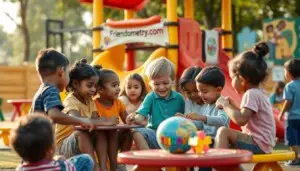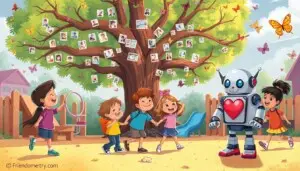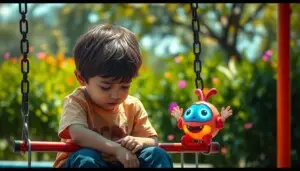How to make friends online for kids: Kids connect online more than ever in today’s digital world. 57% of teens meet new friends online. It’s key to guide them to safe online chats.
Virtual playdates and kid-friendly apps let kids socialize in fun ways. But, keeping them safe online is still the top goal.
Friendometry.com is changing the game. This site helps parents set up playdates. It shows having just one friend can really help a child.
Teaching kids about internet safety is vital. 78% of parents worry about their kids’ safety online. But, with the right advice, 91% of kids feel okay talking about bad online stuff with parents.
We can help our kids make real friends online by being careful yet open. This way, they can enjoy the digital world safely.
Key Takeaways
- 57% of teens have met new friends online, mainly through social media and games
- Friendometry.com offers a safe platform for parent-arranged playdates
- 78% of parents are concerned about their children’s online safety
- 91% of children would talk to parents about uncomfortable online experiences
- Teaching internet etiquette is crucial for safe online interactions
- Balancing online and offline friendships is important for social development
Understanding the Importance of Online Socialization for Kids
In today’s world, online socializing is key for kids’ growth. Age-appropriate websites and safe online groups give kids chances to make friends online.
Benefits of Social Interaction During Childhood
Socializing is crucial for kids. It teaches them to work together, solve problems, and understand others. Sites like Friendometry.com let kids meet new friends safely.
Challenges in Accessing In-Person Socialization
Some kids struggle to socialize face-to-face. Online schools like Connections Academy help by offering fun activities:
- Online clubs
- In-person field trips
- Graduation ceremonies
- Community engagement opportunities
These activities help kids make friends who like the same things as they do.
The Rise of Online Social Platforms for Kids
New social media for kids is becoming popular. These sites are safe and fun for online chats. They have:
| Feature | Benefit |
|---|---|
| Adjustable privacy settings | Keep kids’ profiles safe |
| Real-time interactions | Help with learning together |
| Moderated communities | Keep online talks safe |
Parents should check out their kids’ online activities. They should know the sites they visit and what they share.
Ensuring Online Safety for Children
Keeping kids safe online is very important today. Parents have a big role in keeping their kids safe from online dangers. By using parental controls and teaching internet safety, families can make a safe online space for their kids.
It’s important to know about the Children’s Online Privacy Protection Act (COPPA). This law protects kids under 13 by making websites ask for parent permission before they collect personal info. Parents should watch their kids’ online actions closely.
To help stop cyberbullying, parents should:
- Keep computers in common areas
- Spend time online with kids
- Check credit card and phone bills for strange charges
- Create strong, unique passwords for different accounts
- Use privacy settings on apps and websites
Friendometry.com is a safe place for kids to make friends online. This site lets moms and dads set up playdates. It helps end childhood loneliness one child at a time.
| Warning Signs | Recommended Actions |
|---|---|
| Long hours online | Set time limits and monitor usage |
| Unsolicited gifts | Investigate the source |
| Sudden device shutdown | Discuss online behavior openly |
| Withdrawal from family | Encourage offline activities |
By following these tips and staying alert, parents can help their kids stay safe online. They can also help them make good friends online.
How to Make Friends Online for Kids: Safe & Fun Tips
Making friends online can be fun for kids. With more kid-friendly social media, it’s important to teach them how to be safe. Here are some tips to help kids make friends online safely.
Identifying Age-Appropriate Platforms
It’s important to pick platforms made just for kids. Friendometry.com is a site for parents to set up playdates. It helps end childhood loneliness by connecting kids with friends.
Other safe choices include Kudos for sharing photos and Kibooku for playing together online.
Setting Up Profiles with Parental Guidance
Parents should help create profiles for their kids. This keeps personal info safe. For example, PlayKids Talk checks with parents before setting up.
This step helps keep kids safe as they make friends online.
Teaching Kids to Recognize Safe Online Behavior
Teaching kids about online safety is crucial. Tell them to:
- Avoid sharing personal details
- Communicate well
- Trust their feelings if something seems wrong
Platforms like GoBubble and Togetherville offer safe places for kids to make friends. Remember, one real friend can really change a child’s life.
Kid-Friendly Social Media Platforms
Safe social media for kids is key in today’s digital world. Many apps are made just for kids. They let children interact safely online.
Kudos: Safe Photo Sharing for Kids
Kudos is a secure place for kids to share photos with loved ones. It checks all photos to make sure they’re okay. Parents can relax knowing their kids are on a safe app.
Kibooku: Interactive Play and Socialization
Kibooku is a fun, safe spot for kids to play and make friends online. Adults can watch over their kids’ activities. It has games and social stuff that helps kids make good friends.
Scuttle Pad: Monitored Social Networking for 6-11 Year Olds
Scuttle Pad is for kids 6-11 and makes social networking safe. It stops bad words and checks photos. This keeps kids safe as they make friends and share online.
| Platform | User Base | Key Feature |
|---|---|---|
| PopJam | 1 Million | Creative content sharing |
| Messenger Kids | 1.4 Million | Parent-approved contacts |
| GeckoLife | 8 Million | Family-oriented social network |
For parents looking for other options, Friendometry.com is a great choice. It lets parents arrange playdates for their kids. This helps kids make real friends, which is good for their happiness and growth.
Online Clubs and Activities for Kids
Virtual after-school programs are getting more popular. They offer fun ways for kids to meet and learn. These programs have structured times for making friends and building skills.
For example, Child & Adolescent Anxiety Practice has Virtual After-School Clubs. These clubs meet for 45 minutes each week. They have classes for different ages, making sure the content fits the kids.
Online summer camps are also a big hit. iD Tech offers weeklong camps online for kids aged 7-19. These camps focus on tech and STEM, letting kids work on fun projects together.
Lavner Education also has tech camps for kids in grades 1-9. They keep classes small for more personal attention.
Platforms like Outschool are changing how kids meet online. They offer over 100,000 classes on many topics. Kids can find others who like the same things they do.
FunClubs has 45-minute classes for K-8 students. These classes help kids talk with teachers and friends in small groups.
Playcrafter Kids Club has a 6-week program for kids aged 3-7. Kids meet in small groups for two hours each week. This helps them make friends in a safe place.
Friendometry.com is a special site for parents. It helps set up playdates. It shows how important it is to have real friends, not just online ones.
Building Social Skills Through Virtual Interactions
Kids can learn online social skills through virtual interactions. These digital experiences help them get ready for the digital world. Sites like PlayKids Talk and GoBubble are safe places for young ones to talk and work together online.
Developing Communication Skills
Online chats help kids get better at talking to others. Research shows online students are as good at social skills as those in traditional classrooms. Shy kids often find it easier to talk in online classes, taking their time to join in.
Learning Cooperation and Collaboration
Virtual spaces are great for teamwork and working together. Playing games online with friends helps kids talk more and make friends. Clubs and activities online let kids meet others who like the same things, teaching them how to work as a team.
Fostering Empathy and Understanding
Online chats can help kids feel more empathetic. Parents can explain what characters are doing and how they feel in shows, helping kids understand social signs. This helps kids get better at reading people and following social rules.
| Activity | Social Skill Developed | Benefits |
|---|---|---|
| Virtual Classrooms | Communication | Increased confidence, comfortable environment |
| Online Gaming | Friendship Skills | Maintaining connections, enhancing conversation |
| Digital Clubs | Collaboration | Teamwork, shared interests |
| Watching Shows Together | Empathy | Understanding social cues, societal norms |
Parental Involvement in Online Friendships
Digital parenting is key in managing kids’ online friendships. As kids go online, parents must guide them. A study found 59% of parents worry about their kids making friends online safely.
Supervising online helps make a safe space for kids to meet friends. Parents should watch their kids’ online actions and know the apps they use. This way, they can spot problems early and respect their child’s privacy.
Websites like Friendometry.com let parents set up playdates. These tools help parents manage their kids’ social life online and offline.
| Parental Involvement | Impact |
|---|---|
| Active engagement in online safety education | 82% reduction in online risks |
| Monitoring of online activities | Early detection of potential issues |
| Use of parent-driven platforms | Safer social interactions for children |
Parents should teach kids right online behavior and why privacy matters. Talking openly about online life builds trust. This lets parents guide their kids when needed.
By finding a balance between helping and giving space, parents can help kids make real online friends. They can stay safe in the digital world too.
Addressing Cyberbullying and Online Etiquette
In today’s world, teaching kids about cyberbullying and online manners is key. More kids are online, so they need to know how to stay safe and act right.
Recognizing Signs of Cyberbullying
Cyberbullying is a big problem for many young people. A study showed 27.8% of students have been bullied online, and 87% have seen it happen. Parents and teachers must watch for signs of online bullying.
Teaching Proper Online Behavior
Teaching kids good online behavior is important for safe online interactions. This means respecting others, thinking before posting, and knowing how their actions affect others. By teaching these values, we can make the internet safer for everyone.
Encouraging Open Communication with Parents
Talking openly with kids about their online lives is crucial. When kids feel safe sharing their digital experiences, we can better handle issues like cyberbullying.
| Cyberbullying Scenario | Percentage |
|---|---|
| Witnessed cyberbullying | 87% |
| Targeted by cyberbullying | 34% |
| Teens who view cyberbullying as a major problem | 64% |
Friendometry.com knows how important digital citizenship is. It offers a safe place for kids to meet friends online. By focusing on parent-led chats and watched playdates, Friendometry helps kids have good online times. It also lowers the risks of cyberbullying.
Balancing Online and Offline Friendships
Kids today have a big challenge: finding a good balance in a digital world. Online friendships are easy to make, but real-world connections are key for growth. Parents help their kids by teaching them about healthy screen use and encouraging different kinds of friends.
Studies show that teens often talk to friends online more than in person. This change shows we need a smart way to connect with others. Sites like Friendometry.com can help. They let parents plan playdates and help kids make real friends.
It’s important to have both online and in-person friends. Online chats can make old friends closer and keep them in touch. But, meeting up in person is special. It helps kids learn social skills and understand feelings without words.
- Set clear rules for screen time and app use
- Encourage joining clubs and activities offline
- Use controls to watch over digital chats
- Look for shared interests to make friends
By balancing online and offline social life, kids get the best of both. This way, they learn important social skills, feel good about themselves, and are happier and more successful in the long run.
Conclusion
Safe online socializing is key for kids today, especially with their daily screen time. Kids spend up to seven hours a day with others at school. Sites like Friendometry.com offer a safe place for them to make friends online.
Virtual communities let kids find others with similar interests. They can watch NASA videos or take design classes from Disney Imagineering. These sites help kids learn and connect with others, fighting loneliness.
Parents are key in helping kids navigate online worlds. They should talk with their kids about online friends instead of just limiting screen time. This way, kids learn important social skills and make real friends in our digital world.







